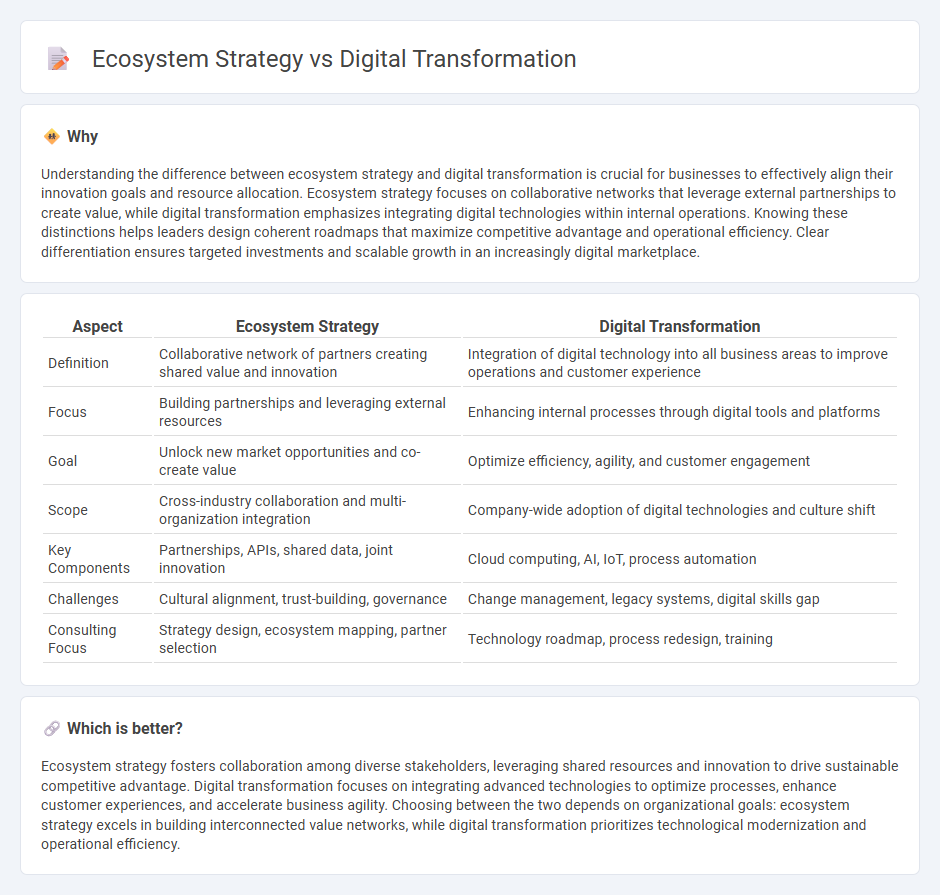
Ecosystem strategy focuses on building interconnected partnerships and collaborative networks to drive innovation and create shared value across industries. Digital transformation emphasizes adopting advanced technologies and integrating digital processes to enhance operational efficiency and customer experience. Explore how aligning ecosystem strategies with digital transformation initiatives can unlock new growth opportunities and competitive advantages.
Why it is important
Understanding the difference between ecosystem strategy and digital transformation is crucial for businesses to effectively align their innovation goals and resource allocation. Ecosystem strategy focuses on collaborative networks that leverage external partnerships to create value, while digital transformation emphasizes integrating digital technologies within internal operations. Knowing these distinctions helps leaders design coherent roadmaps that maximize competitive advantage and operational efficiency. Clear differentiation ensures targeted investments and scalable growth in an increasingly digital marketplace.
Comparison Table
| Aspect | Ecosystem Strategy | Digital Transformation |
|---|---|---|
| Definition | Collaborative network of partners creating shared value and innovation | Integration of digital technology into all business areas to improve operations and customer experience |
| Focus | Building partnerships and leveraging external resources | Enhancing internal processes through digital tools and platforms |
| Goal | Unlock new market opportunities and co-create value | Optimize efficiency, agility, and customer engagement |
| Scope | Cross-industry collaboration and multi-organization integration | Company-wide adoption of digital technologies and culture shift |
| Key Components | Partnerships, APIs, shared data, joint innovation | Cloud computing, AI, IoT, process automation |
| Challenges | Cultural alignment, trust-building, governance | Change management, legacy systems, digital skills gap |
| Consulting Focus | Strategy design, ecosystem mapping, partner selection | Technology roadmap, process redesign, training |
Which is better?
Ecosystem strategy fosters collaboration among diverse stakeholders, leveraging shared resources and innovation to drive sustainable competitive advantage. Digital transformation focuses on integrating advanced technologies to optimize processes, enhance customer experiences, and accelerate business agility. Choosing between the two depends on organizational goals: ecosystem strategy excels in building interconnected value networks, while digital transformation prioritizes technological modernization and operational efficiency.
Connection
Ecosystem strategy enhances digital transformation by fostering collaborative networks that leverage diverse technological capabilities and data exchange to create innovative business models. Integrating ecosystem thinking enables organizations to accelerate digital adoption, improve customer experiences, and optimize operational efficiencies through interconnected partnerships. This synergy drives scalable growth and competitive advantage in the evolving digital economy.
Key Terms
Technology Integration
Digital transformation centers on integrating advanced technologies such as AI, cloud computing, and IoT to enhance operational efficiency and customer experience. Ecosystem strategy expands this scope by fostering collaborative networks among diverse stakeholders, enabling shared innovation and market adaptability through interconnected platforms. Explore how combining technology integration with ecosystem strategy drives sustainable business growth and competitive advantage.
Partner Networks
Digital transformation centers on integrating advanced technologies to enhance internal processes, customer experiences, and business models, whereas ecosystem strategy emphasizes creating collaborative partner networks to drive innovation and expand market reach. Partner networks leverage diverse capabilities and resources from multiple organizations, fostering co-creation and shared value within a connected business environment. Explore more about optimizing partner networks to accelerate your organization's digital transformation and ecosystem growth.
Platform Business Models
Digital transformation drives organizations to adopt advanced technologies, optimize operations, and enhance customer experiences, enabling seamless integration across business functions. Ecosystem strategy emphasizes building collaborative networks of partners, suppliers, and customers to co-create value, often leveraging platform business models that facilitate multi-sided interactions and scalability. Explore how platform business models harness both digital transformation and ecosystem strategies to revolutionize market competition and innovation.
Source and External Links
What Is Digital Transformation? - IBM - Digital transformation is a business strategy that integrates digital technology across all areas of an organization to modernize processes, products, and operations, enabling rapid, customer-driven innovation.
What Is Digital Transformation? Overview, Why, & How - Whatfix - Digital transformation is the process of using digital technologies to transform traditional business processes and services, requiring a clear strategy and measurable KPIs to track progress and achieve business goals.
Digital transformation - Wikipedia - Digital transformation involves adopting digital technology to create or modify products, services, and operations, aiming to increase value through innovation, improved customer experience, and operational efficiency.
 dowidth.com
dowidth.com